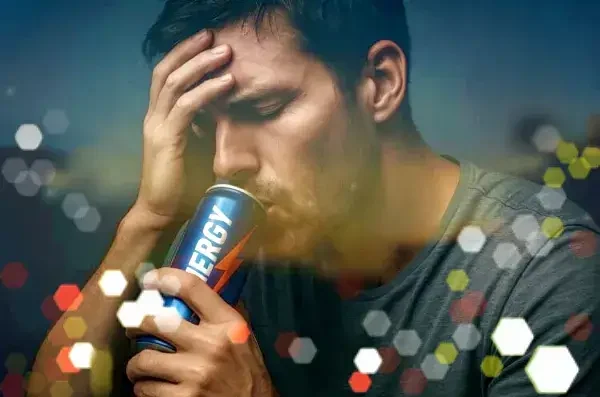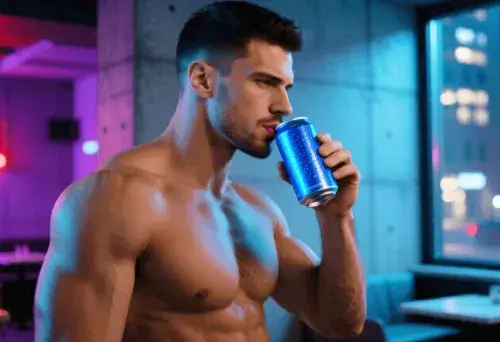Energy Drinks. For years, energy drinks have been a go-to for a quick jolt of alertness. They’re a staple for students cramming for exams, professionals pushing through late nights, and athletes seeking a performance boost.
However, a growing body of scientific evidence is now casting a long, dark shadow over these seemingly harmless beverages. While their physical health risks like heart palpitations, high blood pressure, and dental erosion are becoming widely known.
A new and deeply unsettling concern is emerging: the potential link between energy drink consumption and a heightened risk of suicide.
Energy Drinks and behavior.
This is a stark and serious warning that goes beyond just physical well-being. A recent meta-analysis, one of the largest of its kind, has uncovered a disturbing correlation between the frequent consumption of energy drinks and suicidal behavior.
The findings suggest that this isn’t just a minor risk; it’s a significant one. Researchers note that even consuming just one can a month could be enough to increase the likelihood of suicidal thoughts.
The regular Energy Drinks consumption could triple the risk.
The Unsettling Contrast.
Energy Drinks vs. Coffee.
The same meta-analysis, which included data from over 1.5 million individuals, highlights a fascinating and crucial contrast. While energy drinks were linked to a higher risk of suicidal behavior, coffee seemed to offer a protective effect.
The study revealed that individuals who drank a lot of coffee, more than 60 cups a month, saw their risk of suicide attempts decrease by nearly a third.
This finding challenges the common perception that all caffeine is created equal and underscores the need to differentiate between these two types of beverages.
So, why the dramatic difference?
The answer lies in the cocktail of ingredients found in energy drinks. While the high caffeine content is a major factor, it’s not the only culprit. Energy drinks are loaded with other stimulants and additives like taurine, guarana, ginseng, and massive amounts of sugar.
This potent combination can wreak havoc on the nervous system, leading to anxiety, drastic mood swings, and the exacerbation of pre-existing mental health conditions.
This is particularly concerning for young men, who make up a large portion of the target audience for these products.
Beyond the chemical components, there’s another critical factor: sleep. Energy drinks are often consumed to counteract fatigue and a lack of sleep. However, this creates a vicious cycle.
Chronic sleep deprivation is directly linked to increased anxiety and impulsivity, and these beverages only compound the problem, making it harder to get the restorative sleep the body and mind need.
A Dangerous Interaction with Medications.
The danger of energy drinks extends even further for individuals with psychiatric disorders. The caffeine and other stimulants in these beverages are metabolized by liver enzymes that also break down certain antipsychotic medications, such as clozapine.
This interaction can alter the drug’s concentration in the bloodstream, leading to serious and unpredictable side effects. For patients with conditions like schizophrenia, this could be incredibly dangerous, potentially rendering their medication ineffective or toxic.
The research also suggests that the very act of consuming energy drinks can be a “red flag” for healthcare professionals. Psychiatrists are being urged to pay closer attention to their patients’ habits. Regular energy drink consumption could be an indicator of underlying behavioral or mental health issues.
In this context, these drinks are not merely a harmless way to get a pick-me-up but a potential threat to mental stability.
The Protective Power of Coffee.
On the other hand, coffee’s surprising protective effect against suicidal behavior is explained by its unique properties. The drink is rich in antioxidants, which help combat oxidative stress in the brain.
It also has a positive impact on the gut microbiome, which is increasingly being linked to mental well-being. Unlike the overwhelming assault of stimulants in energy drinks, coffee provides a more moderate, balanced stimulation of the nervous system.
Energy drinks, however, operate on a different principle. The massive doses of sugar and a chaotic mix of stimulants overload the brain, leading to a “crash” and a cycle of dependency and emotional instability.
An additional risk factor is the profile of a typical energy drink consumer often, these are people who may already have an unstable lifestyle or are prone to other dependencies.
The Social Implications and Future Research.
The authors of the study are careful to emphasize that the problem isn’t caffeine itself. The issue lies squarely with the specific formulation of energy drinks, which, when consumed in high doses, can lead to serious consequences, from anxiety and depression to suicidal behavior.
Unlike coffee, these drinks are not a safe or sustainable source of energy. Their widespread availability and aggressive marketing to adolescents and young adults have turned this into a significant public health issue.
It’s important to acknowledge that the study has its limitations. While the threshold for “high coffee consumption” was clearly defined, the “energy drink” category was less precise. A single can could contain anywhere from 75 to 300 mg of caffeine, not to mention varying amounts of other additives.
This highlights the need for more granular research to understand the specific components and dosages that contribute to the risk.
Ultimately, this research serves as a critical wake-up call. Energy drinks should no longer be viewed as a simple refreshment. Their potential to harm mental health, particularly in vulnerable populations, makes them a public health concern that demands greater awareness and regulation.
Before you reach for that next can, consider the potential cost: it could be far higher than you ever imagined.
Do you think these findings should lead to stricter regulations on the sale of energy drinks to minors?
Have a Great Day!




